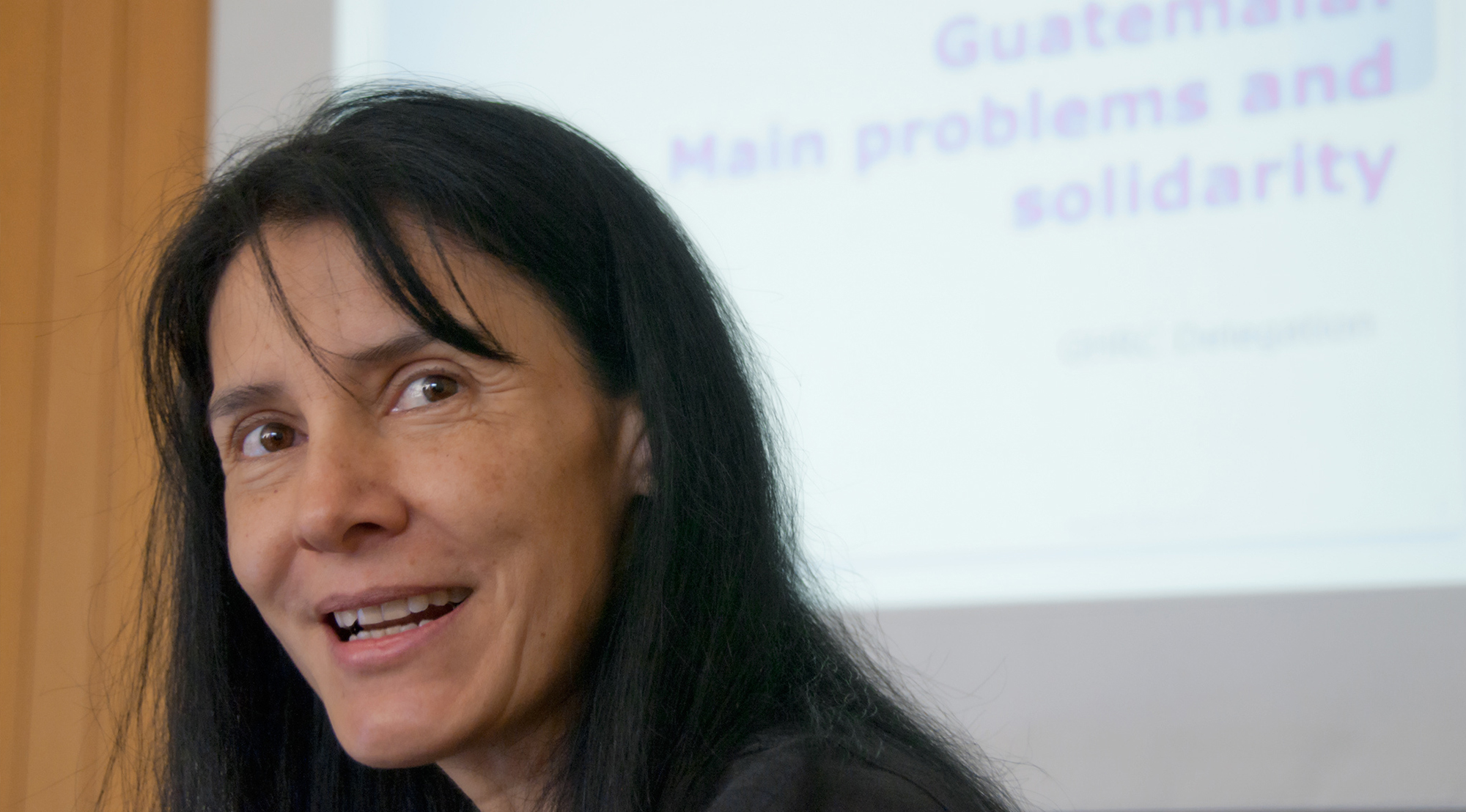Anabella Sibrián is the Director of the International Platform against Impunity in Guatemala, Honduras, and El Salvador (Pi). Pi is an association based in Switzerland, with offices in Guatemala City and Tegucigalpa. Peace Watch Switzerland (PWS) is a member of Pi. The human rights organization looks for volunteers, trains them, and sends them to Guatemala, Honduras, Colombia, and Palestine/Israel as human rights observers. In the following interview with PWS, Anabella Sibrián talks about Pi’s work in the areas of conflict between perpetually professionalizing NGOs and grassroots human rights and peace organizations.
Anabella, please could you give us a brief overview of the work Pi is doing?
Pi is an initiative set up for human rights activists in (predominantly indigenous) communities in the Southern Hemisphere, to help them carry out international advocacy work independently. Right now, we are focusing our efforts on Guatemala, Honduras and El Salvador. We are trying to develop methodologies for active learning, as people understand more about advocacy work by carrying it out than by learning about it in theory.
Pi works both in the conflicting situations of human rights activists and grassroots organizations and with NGOs that are becoming increasingly professionalized. What impact does this have on your work?
Grassroots organizations, social movements, and human rights activists in the affected communities are our priority, as historically, they have had poor access to spaces for international advocacy. Up to now, they were more like information sources for the specialized organizations in the Northern Hemisphere. Even if they were invited to participate in these spaces every now and then, they were rarely able to travel there personally and contribute independently. This is where our work comes in. At the same time, we are trying to leverage synergies with specialized organizations and forge alliances that will help grassroots organizations to continue getting stronger.
How does the professionalization of peacebuilding affect Pi’s work?
The dialectics between theory and practice is fundamental; but what is often understood to be professionalization tends to stop things happening at a technical level and replace political action. As a rule, people working in communities with less access to technical working methods provide more political clarity in their actions. Organizations that are members of Pi want to maintain close contact with the reality of rural areas and indigenous communities from a peacebuilding perspective so that they are able to focus their advocacy work on them.
How does the dynamic between professional NGOs and peace and human rights organizations work on the ground?
Ideally, it should exist in the form of horizontal alliances and – wherever possible – leave the role of the protagonist to the people active in the social movements. This isn’t always easy as many spaces for international advocacy work require participants to have a good command of the English language, which generally isn’t the case for community leaders. We must continue to lobby from within Pi for advocacy spaces in the north to improve access for people from the south to make it easier for them to participate. If we are successful, both regions of the world will benefit.
What do you consider to be the role of volunteers in peacebuilding?
Volunteers use their specialized knowledge to contribute to the grassroots organizations’ technical skills and they also raise awareness and spread information in their home country after their return. Volunteers can therefore contribute to promoting understanding between different cultures and to building equal and respectful relationships for peaceful coexistence.
PWS sends volunteers to areas of conflict, for example Guatemala and Honduras, to accompany human rights activists. How do you think this volunteer work benefits the peacebuilding efforts by professionalized NGOs and what challenges does it present?
One of the most important advantages I can see is that volunteers live and work closely with both employees from professional NGOs and people in the communities. The challenge for the organizations with which volunteers work is that they need to fulfill a few minimum requirements before they can benefit from this support. After all, volunteers are generally sent into contexts in which emergencies need to be responded to on a daily basis and planning proves to be very difficult. If volunteers are expecting a carefully compiled itinerary and detailed “terms of reference” ready for their arrival, they may find the lack of planning frustrating. If they come over with an open mind and an awareness that they are to adapt to the dynamics of the organization and not the other way round, they will be able to experience exceptional cooperative work and, most importantly, very human encounters with the people they live and work with.


